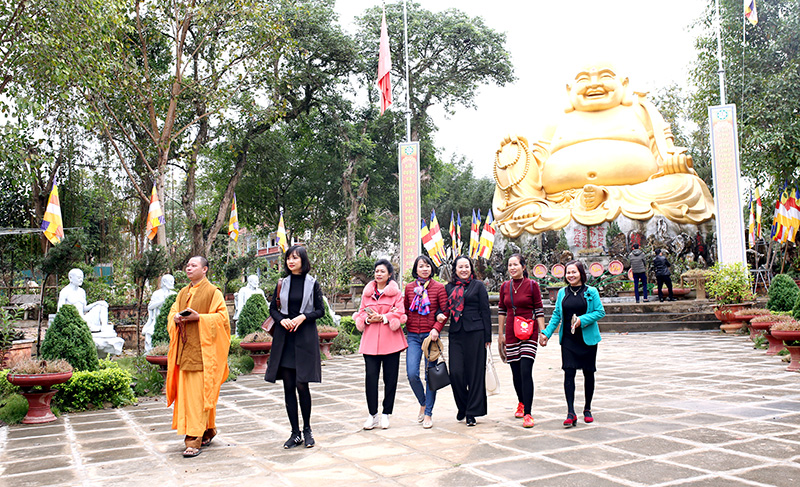
According to Venerable Thich Thanh Tan – abbot of Hang Pagoda, the idea of building an altar to sacrifice heaven on top of Huong Nham mountain (Huong Nghiem) of Hang Pagoda comes from many reasons, including the following very significant reasons. this:
Firstly, although in the past, with the interesting and mysterious landscape, the remaining relics to this day are not enough for visitors to imagine all the famous 16th-century beauty of this ancient temple. . To build a beautiful and meaningful work like the Altar to Heaven on the top of Huong Nghiem mountain, is to create an extremely attractive highlight, so that when visitors come to visit the pagoda, step by step climb to the top of the mountain, they can feel clearly receive the position of the high mountain, the place where the spiritual energy of heaven and earth converges, where the golden clouds curl like dragons flying around the mountain.
Tourists visit Hang pagoda, An Khang commune (Tuyen Quang city).
The second reason comes from the long-standing spiritual meaning of Hang Pagoda. More than four hundred years ago, Hang Pagoda was famous for its sacredness. In the essay about Huong Nham Pagoda, translated by Assoc. Prof – Dr. Dinh Khac Thuan (Institute of Han Nom) from Chinese literature, Hang Pagoda is an extremely sacred and mysterious temple. Legend has it that, when the rulers of the ancient Tuyen Quang region wanted rain, good weather, good crops, and people’s well-being, every year they went to Hang pagoda to pray for the island. There is a passage in the poem: “When heaven and earth are not in harmony, if you pray for the sun, the sky will clear and the clouds will clear, if you pray for the rain, it will spread everywhere. The temple is incredibly flexible.” Building the altar of worship on the top of Huong Nghiem mountain is to continue to maintain the sacredness of Hang Pagoda along with festivals with Buddhist cultural significance and profound humanistic meanings.
The third reason, stemming from the study of history and worshiping activities at Hang Pagoda, the abbot of Hang Chua also discovered that, in Hang pagoda, there used to be Pham Vuong palace (a palace worshiping the Jade Emperor). . The “biography” in Chinese was composed by Dr. Ngo Hoang, in addition to recording the names of meritorious people in 13 districts in the country and people in Thuc Thuy village, Thuc Thuy commune, Thuong Tuc canton, (Phuc Tho village, commune). An Khang today) also quite clearly describes the palace of Pham Vuong at Hang Pagoda. From this discovery, Venerable Thich Thanh Tan became more and more determined to build the Altar of Heaven, with the desire to restore the ancient Jade Emperor worshiping palace. This is the place where heaven and earth intersect, the point of convergence and promotion of the spirit of Hang Pagoda after four hundred years of construction on this sacred land.
In terms of architecture, Venerable Thich Thanh Tan said that the altar is designed according to the religious beliefs of the Vietnamese people, often in combination with worshiping Buddha with worshiping the Jade Emperor and gods (such as Nam Tao, Bac Dau, etc.) Pham Thien, De Thich…). That is why, on the top floor, the Altar to Heaven worships a statue of Shakyamuni Buddha sitting on a lotus pedestal. The statue carries the meaning of compassion and purity, directing people to peace and harmony. On the second floor are three statues including the Jade Emperor (sitting in the middle), Nam Tao and Bac Dau sitting on either side (the statue of Nam Tao holding the birth book on the left, the statue of Bac Dau holding the death book on the right). The Jade Emperor is the supreme ruler of life, death, happiness and suffering… of the entire sky, earth, sea, and underworld, while Nam Cao and Bac Dau are responsible for reporting and recording the destiny of each person, from birth, death, poverty, wealth, fortune, risk to the kitchen work in each family. The last floor will be the 4 statues of the Four Great Heavenly Kings. In addition to the symbolic meaning of covering the 4 directions of East – West – South – North and 4 seasons of Spring, Summer, Autumn, and Winter, the 4 Heavenly Kings are also responsible for protecting the people around the region throughout the year. peaceful day.
According to Venerable Thich Thanh Tan, it is extremely meaningful to build an altar to the heavens at Hang Pagoda in Tuyen Quang city, this will be the place to perform annual sacrifices on occasions such as early spring, summer, and autumn. , Winter solstice to pray for Tuyen Quang to always have good rain and wind, people to be happy, and houses to be warm. In particular, on December 23 every year, Hang Pagoda will hold a ceremony to worship Ong Cong and Ong Tao. From now on, instead of the people of Tuyen Quang doing the worshiping ceremony for Mr. Cong and Mr. Tao at home on December 23, they can go to the Temple of Heaven’s Altar of Hang Pagoda to join the monks to invite to Nam Tao, Bac Dau and Ngoc Hoang, good things have been done in the year and wish good luck to come to the family in the new year, reduce the littering of plastic bags along the banks of rivers, streams, ponds, lakes…
Venerable Thich Thanh Tan said that on December 11 (January 5, 2020) Hang Pagoda will hold a ceremony and inaugurate the God Altar on top of Huong Nghiem mountain at Hang Pagoda. This Buddhist cultural work with profound humanistic meaning will certainly be a spiritual tourist destination attracting a large number of Buddhists, people of Tuyen Quang and the whole country to visit and worship.
Source: Collected internet.
